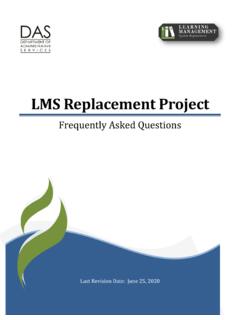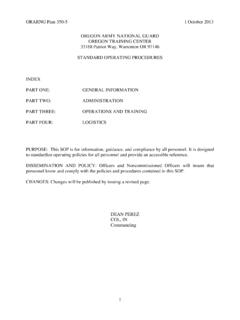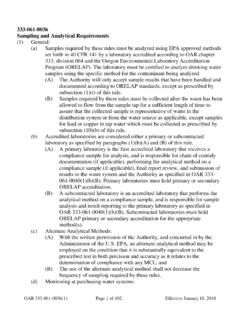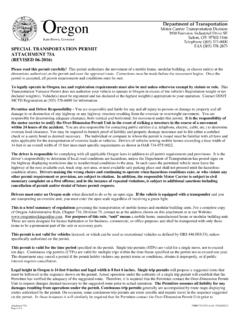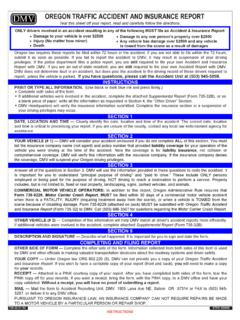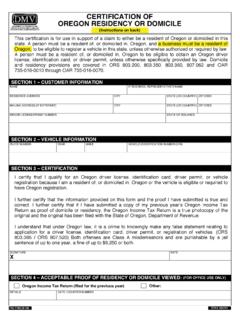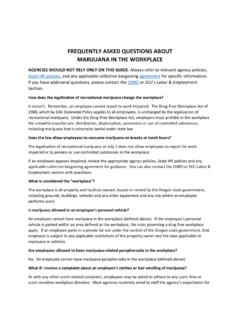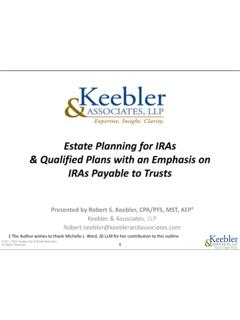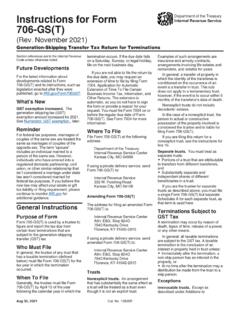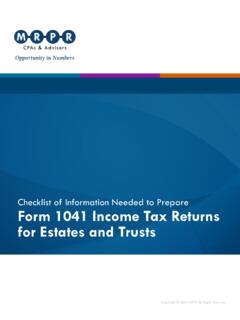Transcription of 2021 Form OR-18-WC Instructions, Report of Tax ... - Oregon
1 Form OR-18-WC Instructions Report of Tax Payment or Written Affirmation for 2021. Oregon Real Property Conveyance Introduction Exemptions Real estate tax payments at a glance Exempt transferors Those who sell Oregon real property are subject to Oregon Authorized agents aren't required to submit tax payments tax on the gain from the sale. When the seller is a non- if the transferor is an exempt transferor. The following are resident, escrow agents and attorneys acting as authorized examples of exempt transferors: agents may be required to withhold and remit tax payments An individual who is a resident of Oregon (see Determin- to the Oregon Department of Revenue as an estimated pay- ing residency status );. ment for any taxes that may be due. Taxpayers will claim A C corporation registered to do business in Oregon ;. these tax payments as estimated tax payments on their A personal representative, executor, conservator, bank- Oregon tax returns filed for the year in which the sale was ruptcy trustee, or other person acting under judicial made.
2 These instructions and forms are designed to inform review;. authorized agents and taxpayers of their requirements. A pass-through entity reporting income on Form OR-20-S, There are exceptions as indicated in these instructions. OR-65, or OR-706, (see exceptions under Determining Purpose nonexempt status ); or A governmental instrumentality (such as city, county, Form OR-18-WC is required for all nonexempt transferors state, or federal agencies). who have not provided written assurance that the entire gain is excludable from federal tax under IRC Section 121. Trans- Authorized agents: Don't use this form for exempt transfer- ferors (and their authorized agents) may use this form to ors. Keep information showing that the seller is an exempt show that this sale is exempt by completing Parts A through transferor. C and signing the form. Transferors: The authorized agent may require proof or have you sign a document certifying that you are an exempt Definitions transferor.
3 Don't submit this document to us, but keep it with your records. The following terms are used in these instructions: Authorized agent is an escrow agent licensed under Oregon Exempt transfers Revised Statutes (ORS) to An attorney is an authorized agent if there is no licensed escrow agent in- Authorized agents aren't required to submit tax payments if: volved and the attorney deposits the proceeds of the sale into The consideration (total sales price) for the real property a client trust account and disburses funds to the transferor. is $100,000 or less;. FEIN is the federal employer identification number a business The transferor delivers a written assurance to the autho- is assigned for federal tax purposes. rized agent, as provided in Treasury Regulation , that the sale or exchange qualifies for exclusion of the Nonexempt transferor is a transferor that is a nonresident of entire gain as the seller's principal residence under IRC.
4 Oregon , including grantor trusts and single-member LLCs Section 121;. owned by an individual or C corporation, or a nonresident The conveyance is pursuant to a judicial foreclosure C corporation that isn't registered to do business in Oregon proceeding, a writ of execution, a nonjudicial foreclosure or is otherwise qualified to do business in Oregon on the of a trust deed, or a nonjudicial forfeiture of a land sale closing date of the conveyance. contract; or Pass-through entity is an entity through which income and The conveyance is occurring instead of foreclosure of expenses flow to the owners of the entity, such as a part- a mortgage, trust deed sales contract, or other security nership, S corporation, limited liability company (LLC), instrument, or a land sale contract with no additional limited liability partnership (LLP), certain trusts, or estates. monetary consideration. See Determining nonexempt status for LLCs and grantor Principal residence exemption.
5 If the nonexempt transferor trusts that are disregarded entities. is selling a personal residence located in Oregon and the Transferee is a person who acquires ownership of real prop- entire gain qualifies for exclusion under federal law, the erty located in Oregon . transferor must provide the authorized agent with: Transferor is a property owner who transfers, sells, deeds, or A written assurance that all of the gain qualifies for exclu- otherwise conveys their ownership interest in real property sion under IRC Section 121; or to another person or entity. 150-101-284-1 (Rev. 08-13-20). 1. 2021 Form OR-18-WC Instructions A signed Form OR-18-WC with Parts A through C com- of Oregon for part of the year. A part-year resident may only pleted. claim exemption from this requirement if the conveyance The authorized agent will send us a copy of the written as- occurs and the proceeds are disbursed during the part of the surance or Form OR-18-WC .
6 Year that the transferor is a resident of Oregon or another exemption applies. If the nonexempt transferor is selling a personal residence and the entire gain isn't excludable from federal tax, the transferor Example 1: Anne moved from Oregon to California on and authorized agent must complete Form OR-18-WC . Situa- March 31, 2021. She sold her Oregon property on July 28, tions where the entire gain isn't excludable include situations 2021. Even though Anne was a resident of Oregon for the when the transferor claimed business use of home deduc- first three months of the year, she wasn't a resident at the tions in the past, or the gain exceeds the federal exclusion time of the conveyance so she may not claim exemption as a amount. resident of Oregon and must complete Form OR-18-WC . If it was Anne's principal residence for 5 years before she moved Authorized agents: If the transferor is selling their personal and her gain is $250,000 or less, she qualifies under federal residence and has provided you with a written assurance law to exclude the gain from tax.
7 She will claim the appro- that the entire gain qualifies for exclusion under IRC Section priate exemption in Part C when she completes the form. 121, don't use this form. Determining nonexempt status Determining residency status Tax payments are required when nonresidents sell Oregon Disregarded entities real property, unless the transfer is exempt. If it's uncertain If a transferor is an LLC or a grantor trust, special rules apply whether transferors are Oregon residents, use the criteria for tax purposes. Generally, these entities are disregarded for below to help make that determination or have them provide tax purposes. To determine if the entity is disregarded for a signed statement indicating their residency status. tax purposes, use these guidelines. LLCs. Authorized agents should disregard an LLC owned Oregon resident entirely by an individual, spouses, or a C corporation. They A transferor is a full-year resident of Oregon (even if living should base payment requirements on the owner instead of outside of Oregon ) if all of the following are true: the LLC.
8 If an LLC is owned by one individual or spouses The transferor thinks of Oregon as his or her permanent filing a joint return, treat the member(s) as individuals and home; follow the related instructions. If the LLC is solely owned Oregon is the center of the transferor's financial, social, by a C corporation, treat it as a C corporation and follow and family life; and the related instructions. If the seller is a single member LLC. Oregon is the place the transferor intends to return to owned by an exempt transferor, such as an LLC with mul- when away. tiple owners or an S corporation, then the authorized agent won't send in payments because the pass-through entity is The transferor is still an Oregon resident if he or she moves required to do so using Form OR-19. out of Oregon temporarily or moved back to Oregon after a temporary absence. Grantor trusts. A grantor trust isn't recognized for tax purposes because the grantor retains substantial control.
9 A. Oregon nonresident grantor trust is sometimes referred to as a revocable trust . or a living trust. As long as the grantor is living, treat the A transferor is a nonresident of Oregon if they maintain trust as an individual and follow the related instructions. their permanent home outside of Oregon all year. Oregon Fill out the form and submit any payments in the name of residents may be deemed nonresidents if they: the individual. Maintained a permanent home outside of Oregon the If the grantor is deceased, the trust is irrevocable. This form entire year; and and tax payments aren't required for an irrevocable trust. Didn't keep a home in Oregon during any part of the year; and Spent less than 31 days in Oregon during the year. Form OR-18-WC . Form OR-18-WC is retained in the records of the authorized Oregon part-year resident agent for six years from the date the transaction closed. The A transferor who moved into or out of Oregon during the authorized agent also sends the original Form OR-18-WC .
10 Calendar year is a part-year Oregon resident. The individual and any required attachments to the department. The trans- is a resident of Oregon for part of the year and a nonresident feror should keep a copy of the completed Form OR-18-WC . 150-101-284-1 (Rev. 08-13-20). 2. 2021 Form OR-18-WC Instructions When the property is owned by more than one Note: If you can exclude all of the gain under Internal Rev- transferor enue Code (IRC) section 121 for selling your home, use Part C. Don't use Part C if you're able to exclude gain from taxa- Each transferor is considered separately. If one transferor is tion under a different federal law, or if you can only exclude exempt, tax payments are only required on the portion of part of your gain under IRC section 121. In those situations, the conveyance attributable to the nonexempt transferor(s). complete Part D and show the applicable IRC and excluded If two transferors are married and intend to file a joint gain on line 11.
